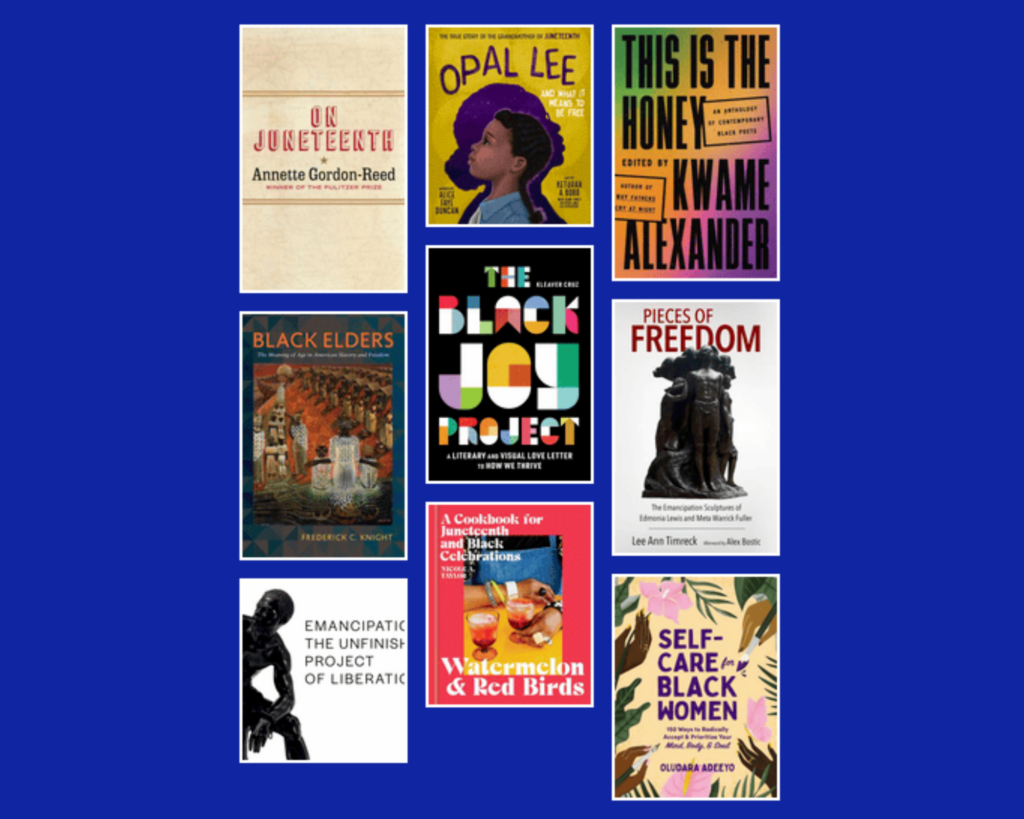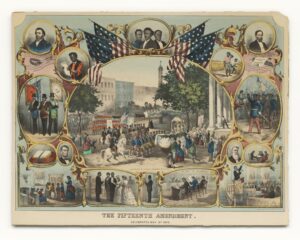Celebrating Juneteenth 2024

“African Americans have always used these moments of memory to think about where the community has come from and what we’re pursuing and striving towards, as well as taking the time to pass down history and culture.
Juneteenth is a time to reflect. What does it mean to really celebrate our freedom? What does it mean to be free in moments where freedom is conditional, and freedom is always a challenge? Juneteenth is a moment to think about freedom being conditional freedom and it is something that we must continuously strive and fight for.”
-Angela Tate, National Museum of African American History and Culture, Curator of African American Women’s History

Unidentified
At center, a depiction of a parade in celebration of the passing of the 15th Amendment. Framing it are notable anti-slavery forces such as John Brown and Frederick Douglas. (from the collection of the Smithsonian National Museum of African American History and Culture)
Juneteenth is also known as Freedom Day, Emancipation Day and Jubilee Day.
On June 19, 1865, Major Gen. Gordon Granger led Union soldiers into Galveston, Texas, with news that the Civil War had ended and slavery was abolished – two years after the Emancipation Proclamation.
President Lincoln’s edict had little impact on the people of Texas, since there were few Union troops around at the time to enforce it. But, with the surrender of Gen. Robert E. Lee in April 1865 and the arrival of Gen. Gordon Granger’s regiment in Galveston, troops were finally strong enough to enforce the executive order. Newly freed people rejoiced, originating the annual “Juneteenth” celebration.
But as Mary Elliott (Curator at the National Museum of African American History and Culture) notes, “June 19th freed enslaved people in the rebelling states, it did not free enslaved people throughout the nation. Keep in mind, there were still border states which were still part of the Union. They had not seceded from the Union, and they still maintained slavery. Maryland, for example, was one of them. It took the creation of the Emancipation Proclamation, the end of the Civil War, and the passage of the 13th Amendment to finally end slavery throughout the nation.”
“I like to think of Juneteenth as a celebration of freedom, of family, and of joy that emerged from this cauldron of the war…
Juneteenth is for everyone who believes in freedom, and who believes in creating a new world.”
-Kelly E. Navies, National Museum of African American History and Culture, Museum Specialist of Oral History
Although Juneteenth has been informally celebrated each year since 1865, it wasn’t until June 3, 1979, that Texas became the first state to proclaim Juneteenth an official state holiday.
Juneteenth Resources
- Find the full NMAAHC Juneteenth discussion from Angela Tate, Mary Elliott, and Kelly E. Navies
- The National Museum of African American History & Culture has a Juneteenth portal and a digital toolkit where you can read historical documents, watch historical films, find recommended reads, and look through items of historical significance in the collections of the museum.
- Check out Portland Public Library’s Juneteenth booklist. This list shares nonfiction and fiction titles related to history, resistance, emancipation, liberation, joy and well-being, and culture. You can find Vanessa M. Holden writing on African American women and resistance, Jesse McCarthy on reparations, and Nicole A. Taylor on years of Juneteenth celebrations.
- The Juneteenth list also includes titles like This is the Honey: An Anthology of Contemporary Black Poets, The Black Joy Project, Rest is Resistance, How the Word is Passed, My People: Five Decades of Writing About Black Lives, Jubilee: Recipes from Two Centuries of African American Cooking, Make Good the Promises, and much more. For more resources from PPL you can reach us at the library, readersadvisory@portlib.org, or 207-871-1700 ext. 725.
- 2024 Juneteenth events at PPL
- 2024 Juneteenth events elsewhere in the state
tags: Adults | Teens | Seniors | Art & Culture
